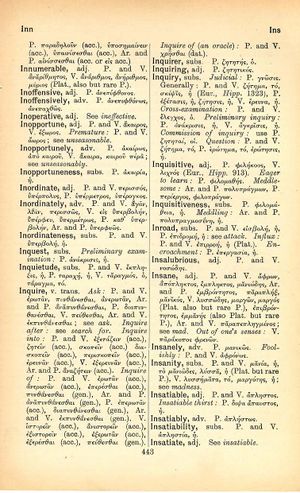insane
ὃ γὰρ βούλεται, τοῦθ' ἕκαστος καὶ οἴεται → what he wishes to be true, each person also believes to be true | what he wishes, each person also believes
English > Greek (Woodhouse)
adj.
P. and V. ἄφρων, ἀπόπληκτος, ἔμπληκτος, μανιώδης, Ar. and P. ἐμβρόντητος, παραπλήξ, μανικός, V. λυσσώδης, μαργῶν, μαργός (Plat. also but rare P.), ἐπιβρόντητος, ἐμμανής (also Plat. but rare P.), Ar. and V. παραπεπληγμένος; see mad. Out of one's senses: V. παράκοπος φρενῶν.
Latin > English (Lewis & Short)
insānē: adv., v. insanus.
Latin > French (Gaffiot 2016)
īnsānē¹⁴ (insanus), follement, d’une manière insensée : Pl. Curc. 179 || prodigieusement : *Pl. Mil. 24, v. Varro L. 7, 86 || -nius Hor. S. 1, 10, 34 ; -nissime Aug. Ep. 69, 2.
Latin > German (Georges)
īnsānē, Adv. (insanus), unsinnig, toll (auch wie dieses = »sehr heftig«), amare, Plaut. Curc. 177 (wo Götz insanum): estur ins. bene (verzweifelt gut), Plaut. mil. 24 Lor. (wo Brix u. Ribbeck insanum bene). – Compar., in silvam ne ligna feras insanius, Hor. sat. 1, 10, 34. – Superl., ut insanissime desperentur, Augustin. epist. 69, 2: Manichaeorum errori insanissime acquiescimus, Augustin. de civ. dei 1, 20. p. 35, 4 D.f2

